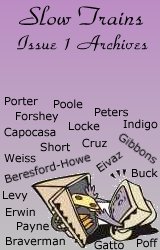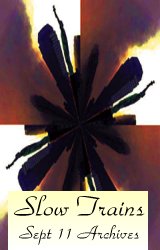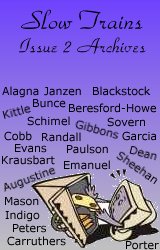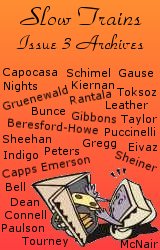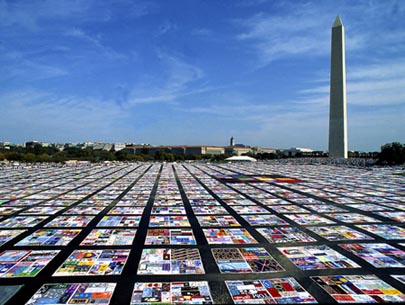
Story From a Quilt
by Margaret Coulson
Australia
Somewhere in the world there is a quilt, patched together with love and
tears, weaving the stories of lives cut short. Some of the patches are
professional and intricate, hundreds of hours of fine point needlework
telling the tale. Other patches are not so delicate, but equally sewn
together in commemoration by people who care. Somewhere on the quilt,
there
is one patch, amateur in appearance, its parts disconnected, the
stitching
crooked and awkward. The maker of the patch cursed her lack of artistic
talent, the collage of simple images failing to capture the complex
beauty
of her friend. Yet, when seen as part of the quilt, one patch among
many, it
too exudes a story of celebration and pain.
On the top left hand corner there is a bright, yellow sun, the
innocent
type of sun drawn by pre-schoolers with its rays shining down. Beneath
the
sun, the opening bars of "The Old Rugged Cross" are interwoven with
tiny zig
zag patches of blue. The story of how he radiated light. The man and
his
music. The church on the sea.
Alton was fragile as glass, his wiry, copper hair forming an unruly
halo of
curls that seemed somehow too heavy for his slight frame to carry. His
skin
was pale, almost transparent, yet soft as the day he was born. As if in
compensation for his physique, Alton could play Handel so that angels
sang.
The light where we lived back then was harsh and piercing. Specks of
sweat
on his knuckles in the midday heat. Ruddy, rich faces of children whose
parents were successful farmers and doctors and lawyers staring
politely in
resistant silence. These successful farmers and doctors and lawyers had
built a church which overlooked the ocean. A clear glass window with
Jesus
on Galilee had been strategically placed so that He appeared to be
walking
on the water.
Most church musicians accompany the choir, but Alton's melodic playing,
the
voices of the choir, the gentle lull of the ocean were all one, a
single
entity, soaring in exultation towards the heavens. The church has
extensions
now and the pipe organ has been replaced by an electric piano. Salt
breezes
are not kind to musical instruments. Jesus still walks on the ocean but
somehow the building has become colder with age. The bitter sun shines
accusingly at the words of the hymns as they are projected onto a
screen at
the front. I can no longer feel my friend in this place which so
willingly
took his divine music, yet so cruelly discarded him when his body was
spent
and he could no longer play. The rejection was subtle of course. A
refusal
to shake hands. A pointed sermon. Whispers and stares. Throughout it
all,
Jesus still stared from the window with a faint, half-smile. He never
wept.
In the top right hand corner there is a hammer and sickle, with some
bars
from the "Russian National Anthem" beneath. Beside the hammer and
sickle
there is a cage. Prison cell when he was arrested. Trapped by the depth
of
his beliefs. Caged by society because his sexuality did not
conform.
Communists were rare in Australian towns which boasted churches that so
convincingly
depicted Jesus performing miracles. The tiny rooms where Communists met
were
dark and smoky with nervous-looking people who mostly spoke in strange
accents. The piano was always old but Alton would still have been able
to
reach the angels, if only Communists didn't swear atheism as part of
their
creed. The songs however, were always spirited and stirring, offering
hope
for the working classes whose parents couldn't afford to contribute to
church building funds. Alton was buried with only one prized
possession, a
copy of "Das Kapital" I had given him for his twenty-first birthday. It
was
the second copy he'd owned. I'd first given him a copy for his
seventeenth
birthday. It had been destroyed in a flurry of batons and paddy wagons
during an antigovernment street march two days later. Blood on the
walls of
a soundproof, padded cell. Rough hands and furtive nakedness claiming
his
puny body. Even as he rejected the pain, he had been exposed to a
possibility that boys from parochial Australian towns did not know
existed.
Being a student and a Communist is a good combination. It allows you to
feel
self-righteous about egalitarianism because you are forced to be frugal
if
you do not work. It also allows for a certain amount of hedonism
without any
particular irony. Such is the prerogative of the young. Some of the
bars are
still there -- bright, glittering monuments to the excesses of cheap
wine and
youth. The music is techno now and the ubiquitous, revolving disco
light has
long been replaced by tasteful halogens. The clientele look the same
though.
Coy, neat young men surrounded by slightly older male poseurs and women
in
retro furs. Back then, the music had always been live. On days when our
student allowance was paid, we would decadently sip liqueurs in that
moody
half-light associated with cocktail bars while Alton played selections
from
Neil Young to Berlioz. Later in the month, when our allowance was
spent, he
would play Billy Joel while I shamelessly begged. It was a fair
redistribution of wealth, we both reasoned.
In the end, poverty and Utopia lost their appeal for most of us as we
embraced postmodernism, travelling in search of new ideals. Alton,
however,
remained steadfast in his views. He recited Mao as easily as he
interpreted
Bach, sometimes even putting "The Little Red Book" to music for the
trendy,
suited crowds who needed to assuage a little of their guilt at being
successful. The belief in sharing worldly goods was equally applied to
his
refrigerator and his bed, many admirers sharing his manifesto for a
while,
but none able to maintain the intensity for long.
At the bottom of the patch there are big, childish raindrops falling
on
top of a cake. The cake has twenty-three candles. Beside the cake,
there is
a mug, white froth piled high. Singing in the rain. The rain on his
parade.
Coffee and cake. The lone guest at his final birthday party.
The last time I saw Alton happy, was in the Melbourne rain. It was a
light,
warm, summer rain that tickled the skin and gave youth permission to
splash
carelessly through puddles. We ran from coffee shop to coffee shop,
savouring the new bourgeois café culture and Brazilian ground beans,
high on
caffeine and wicked decadence and life. We drove up to the Dandenong
Ranges,
singing in tune with the windscreen wipers, our mouths still warmed by
cappuccinos and melting moments. When we reached the lookout, the
shower had
stopped. Tall trees dripped with diamond raindrops. The velvet, green
haze
which makes everything so much sharper immediately after rain cloaked
the
valley below. A rainbow stretched before us, its myriad of colours
defying
the usual spectrum. We found no pot of gold.
Too soon, the music for Alton ceased. He lay in a hospital bed, trapped
by
gnarled hands and a shrinking body. Others in the ward, their minds as
decrepit as their wasted bodies, served as a prophecy for his future.
It
wasn't even a ward as such, just a closed veranda in an old forgotten
wing
of the hospital. Purgatory for those dying from sin. On a bright,
spring
day, we escaped like naughty schoolchildren, hiding behind a giant fig.
There we ate forbidden coffee cake and giggled. Together we wrote his
eulogy, seeking just the right balance of pathos and truth. Enough to
make
people remember, not enough to make them weep at the wake, plenty to
shock
the priest. His words. My words. A final composition. My presence
wouldn't
be required at the funeral he informed me. There would be plenty of
neat
young men and women in retro furs to share the final parting of his
soul. I
sang "Happy Birthday" out of tune and left him sitting beneath the fig,
a
hint of cake crumbs on his thin, cracked lips.
Somewhere in the world there is a quilt. It traverses vast oceans to
weave
its stories of lives cut short. It has seen opera houses in Rome and
blues
bars in New Orleans. It travels to all the places Alton wanted to see,
absorbing the music he would never hear.
I remember the day that Alton died. I was teaching out west. Low mulga
scrub
on the flat, red dust. There had been drought for seven years.
Suddenly,
children ran from the classrooms, lifting their eyes, their faces,
heavenward in bewildered joy. I stood outside too, the unseasonable
droplets
causing me to shiver. And the rain tumbled down.

